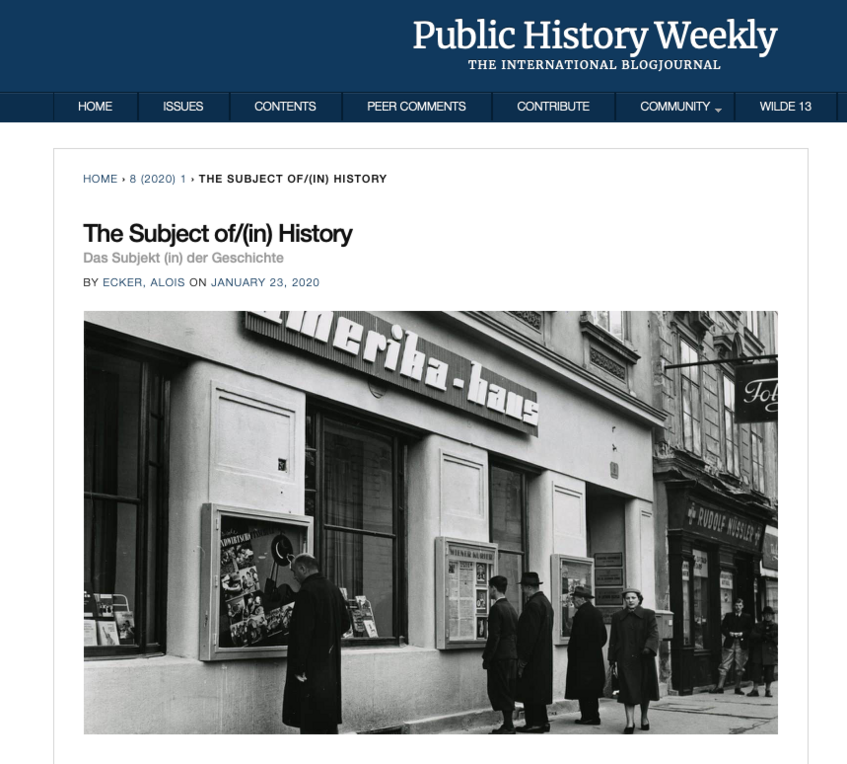New Publications
The subject of/(in) history
The subject of/(in) history
- Ecker, Alois (2020) The subject of/(in) history. In: Public History Weekly (1/2020). The International Blog Journal, dx.doi.org/10.1515/phw-2020-14836
Weblink: https://public-history-weekly.degruyter.com/8-2020-1/subject-history/ (23.01.2020)
Abstract
This essay introduces 'historical consciousness' as one of the core concepts of historical learning. A comprehensive typology is needed in order to compare systematically the core concepts in an intercultural perspective. Such typology will be sketched out on the example of the comparison between three different approaches to the concept of 'historical consciousness': It will be asked (1) how the subject of the historically conscious 'human being(s)' is conceptualized in the various approaches and (2) how the modus operandi of developing and/or constructing 'historical consciousness' is conceptualized. a) The first type to be introduced refers to Hans-Georg Gadamer's concept of historical consciousness which is constituted in a dialectic process between self-reflection and the hermeneutic interpretation of historical sources against the universal horizon of history. Complementary, two types of historical sense-making as developed by Jörn Rüsen will be discussed: b) the four modi of historical sense-making by narrating history, where narration is introduced as an indispensable mental operation by which human experience is being interpreted in [the course of] time; c) historical consciousness as a social construction in the communicative process, where historical consciousness develops in the 'here and now' of interaction between several persons involved in the process of negotiating cogent/plausible historical narratives.
The Education of History Teachers in Europe
- Ecker, Alois (2018). The Education of History Teachers in Europe - A Comparative Study. First Results of the “Civic and History Education Study”, Creative Education Vol. 9, p. 1565-1610
DOI: https://doi.org/10.4236/ce.2018.910115.
Abstract
The “Civic and History Education Study” is the first comprehensive study in Europe to describe and analyse the formation of school teachers of the historio-political subjects. Based on a systemic and organizational approach, between 2010 and 2013 more than 46 institutions of 33 countries in the European Higher Education Area (EHEA) have been investigated and compared on the existing full study programs in initial teacher education for school subjects “History”, “Civic/Citizenship Education”, “Politics”, “Social Studies” and “Cultural Studies”. The nature and quality of the education and training that teachers of these subjects receive seems crucial for reflecting the social and political developments of life in multicultural and diverse societies. History teachers and teachers of “Social Studies” or “Civic Education” are expected to contribute substantially to the formation of the socio-political identity of the future citizens of Europe. The pupils’ competences for democratic citizenship, intercultural dialogue, mutual understanding and tolerance are expected to be developed during secondary school education. The central question of the project-group therefore was: Are the teacher education programs conceptualized to provide the trainee teachers with the requested knowledge and skills for acting as these responsible educators of the future European citizens? This paper describes the structures of initial teacher education for the concerned subjects in the European countries: It gives information on the various types of teacher education institutions, the architecture of teacher training programs, the models of training, the length of studies, the relation between subject oriented and professional training, the forms of induction and the multifaceted forms of tutoring and mentoring. In the main part of the paper, crucial qualitative aspects in the formation of the historio-political competences of teacher trainees will be introduced and compared. An analysis of the aims, the theoretical basement, the content as well as the pedagogical/didactical concepts of curricula will be given, and relevant aspects of the formation of methodological and didactical competences of teacher trainees by academic and professional training will be compared and analyzed. Special emphasis will be given to the formation of their communicative and cooperative skills and the formation of media literacy.

